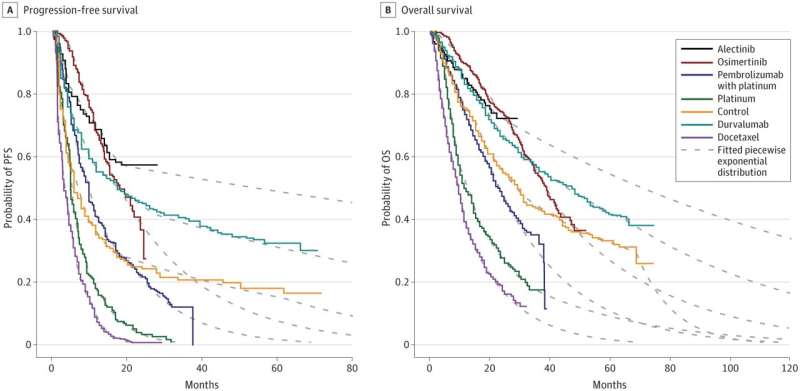This article has been reviewed according to Science X's editorial process and policies. Editors have highlighted the following attributes while ensuring the content's credibility:
fact-checked
peer-reviewed publication
trusted source
proofread
Study: Access to targeted lung cancer drug is cost-prohibitive globally

Many countries with national health care systems or payers such as insurance companies use cost-effectiveness analyses to decide whether to cover new medicines, balancing treatment costs with potential health benefits.
That strategy often limits access to new, targeted therapies, even when these drugs prove highly effective and become part of standard-of-care therapy for many patients.
A new study from Sylvester Comprehensive Cancer Center at the University of Miami Miller School of Medicine examined the cost-effectiveness of durvalumab, a targeted immunotherapy for lung cancer that is known to extend lifespan. The findings show that the drug exceeded official cost-effectiveness thresholds for all four analyzed countries: the United States, Brazil, Singapore and Spain.
The study could help guide drug-pricing strategies to reduce financial burdens and increase the number of patients who benefit from treatment.
"Cost-effectiveness analyses can help establish a value-based price for discussions with payers," including insurance companies and national health care systems, said senior author Gilberto Lopes, M.D., chief of Medical Oncology and medical director for International Affairs at Sylvester.
Cost-effectiveness analyses can also inform biopharma companies about barriers to access, resulting in pricing-structure changes for targeted drugs in different countries, he added.
That's a key aim of the Access to Oncology Medicines (ATOM) Coalition, a global initiative chaired by Lopes to improve access to oncology treatments in low-income countries.
Effective but unavailable
Since its approval for lung cancer in 2018, durvalumab has become part of the standard of care for the disease. The drug is used as a maintenance therapy, usually for a year, after primary chemotherapy for unresectable (inoperable), locally advanced non-small cell lung cancer (NSCLC).
The drug extends lifespan by more than 18 months compared to placebo, according to an analysis of five years of data from the PACIFIC clinical trial.
Despite its effectiveness, durvalumab access is limited in some settings. In Brazil, for instance, the drug was approved in 2020 but remains unreimbursed by its public health system.
Calculating cost-effectiveness
In this new study, published in JAMA Network Open, the researchers developed a model to assess durvalumab's treatment costs and health benefits in lung cancer patients over a 10-year period.
To calculate treatment costs, the researchers collected a wide range of data, including drug pricing in different countries, administration costs, adverse events and follow-up care. In the U.S., the cost of treatment with durvalumab was $114,394.
To quantify health benefits, the researchers used a measurement commonly used in economic evaluations called quality-adjusted life years (QALYs). This data combines lifespan gains with information on quality of life.
The researchers then generated a single metric called an incremental cost-effectiveness ratio. The researchers found that the cost-effectiveness ratio in the U.S. for durvalumab was $228,788 per QALY.
Though Medicaid and Medicare typically pay for the drug, this cost-effectiveness ratio exceeds the agencies' threshold target of $150,000. The cost-effectiveness ratios also exceed health system thresholds in the other analyzed countries.
Overall, the study authors concluded that durvalumab treatment for lung cancer remains globally "cost-prohibitive."
The researchers went on to show how reduced industry pricing can improve cost-effectiveness. This analysis used discounted prices in Singapore that are available through an industry pricing program. The program brought the cost-effectiveness ratio down from $153,461 per QALY to $45,164—below the official threshold in Singapore.
Increasing access
"The overall goal of these types of studies is to shed a very academic, and hopefully neutral light on all these numbers," said study first author Samuel Kareff, M.D., Sylvester's chief hematology and oncology clinical fellow. Dr. Kareff will also present the data May 30 as an invited speaker at the OncLive National Fellows Program.
The study's strengths include accounting for multiple lines of therapy and using biomarker-guided treatments in its model (durvalumab targets a molecule called PD-L1, which is typically screened for prior to treatment). Limitations of the study include its narrow global coverage and the lack of analyses in poorer countries where access is more restrictive, Kareff explained.
He noted that drug companies face the challenge of recouping their massive drug-development costs while ensuring patients are served. Cost-effectiveness analyses can help, he said.
In May, Bristol Myers Squibb released its 10-year strategy to improve access to treatments for patients in low- and middle-income countries, including a collaboration with the ATOM Coalition to increase access to another targeted immunotherapy, nivolumab.
"As the pace of innovation increases and more targeted therapies become available, we unfortunately expect treatment costs to increase as well," Kareff said.
More information: Samuel A. Kareff et al, International Cost-Effectiveness Analysis of Durvalumab in Stage III Non–Small Cell Lung Cancer, JAMA Network Open (2024). DOI: 10.1001/jamanetworkopen.2024.13938


















